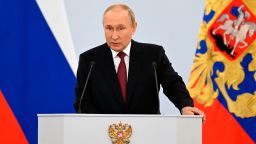The Swedish Coast Guard said that one leak from the Nord Stream 2 pipeline had not stopped but instead grown larger in size, according to Swedish authorities.
Following a fly-over of the leak locations on Monday morning a leak from Nord Stream 1 was no longer visible and therefore could be said to have stopped, the Swedish Coast Guard said.
However, “the smaller one from Nord Stream 2 is instead slightly larger than yesterday” and measured around 30 metres in diameter, the coast guard said in a statement.
The coast guard added that it is taking “emergency” measures for a longer time than expected, due to the larger leak.
The coast guard’s announcement came after Russian state-owned energy supplier Gazprom earlier stated all leaks had stopped in both pipelines, but said it is still working to “reduce pressure in line B of the Nord Steam 2 gas pipeline.”
It is unclear if pressure in line B could lead to the larger leak seen by the coast guard.
The pipelines, which run under the Baltic Sea near Sweden and Denmark, were created to funnel gas from Russian into the European Union.
More background: When Swedish authorities first cited the leaks on Tuesday it prompted fears around European reliance on Russian energy, a problem that has only deepened since Moscow invaded Ukraine in February.
European leaders swiftly denounced the leaks, with European Union foreign policy chief, Josep Borrell, saying the leaks were likely “the result of a deliberate act.” European Commission President Ursula von der Leyen referred to them as “sabotage action.”
US President Joe Biden said the leaks were a “deiberate act of sabotage,” after it emerged that European security officials on Monday and Tuesday observed Russian Navy support ships in the vicinity of leaks in the Nord Stream pipelines likely caused by underwater explosions.
At the time it was unclear whether the ships had anything to do with the explosions, these sources and others said – adding that it was one of the many factors investigators would be probing.
CNN’s Allie Malloy, Maegan Vazquez, Katie Bo Lillis, Natasha Bertrand and Kylie Atwood contributed reporting.




























